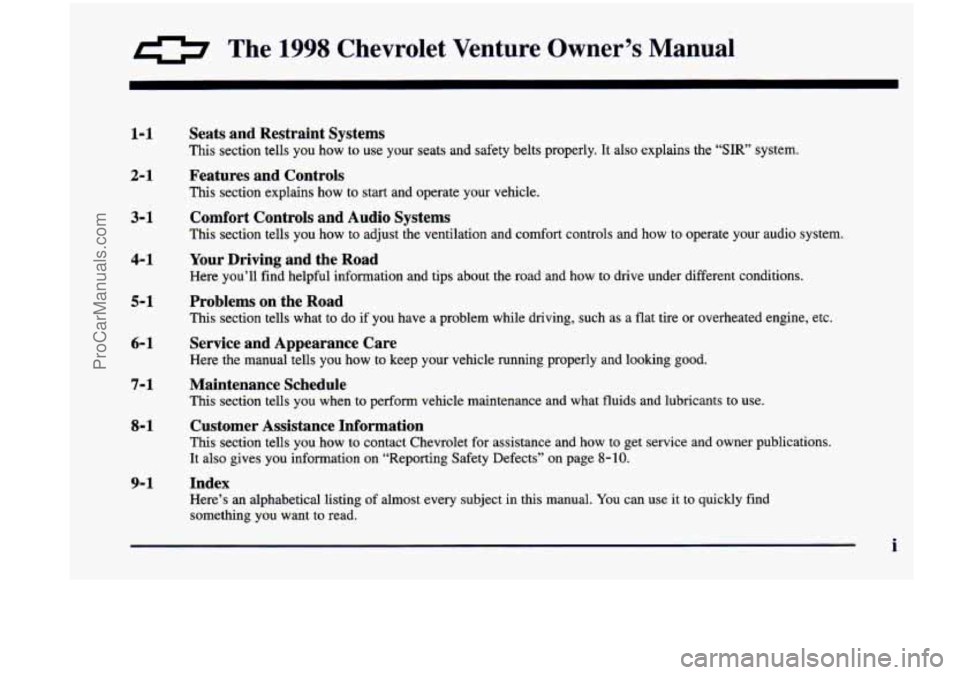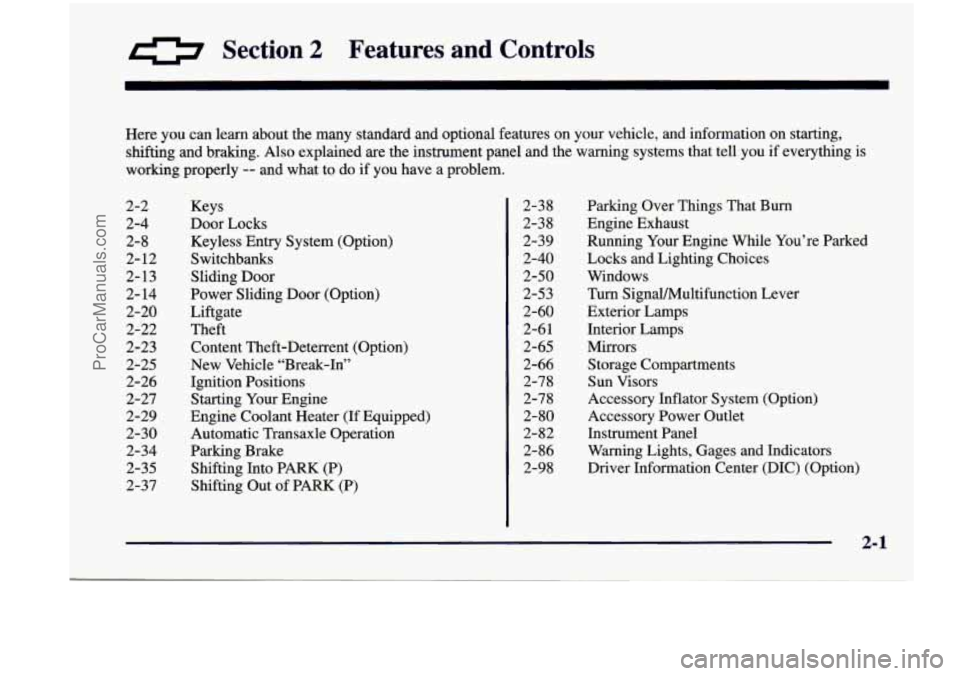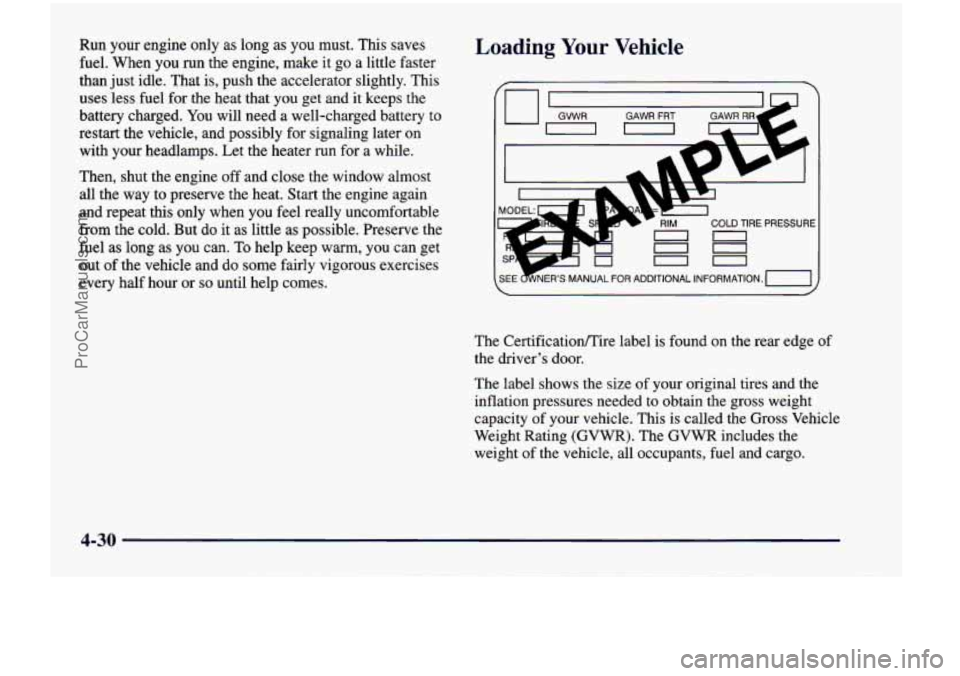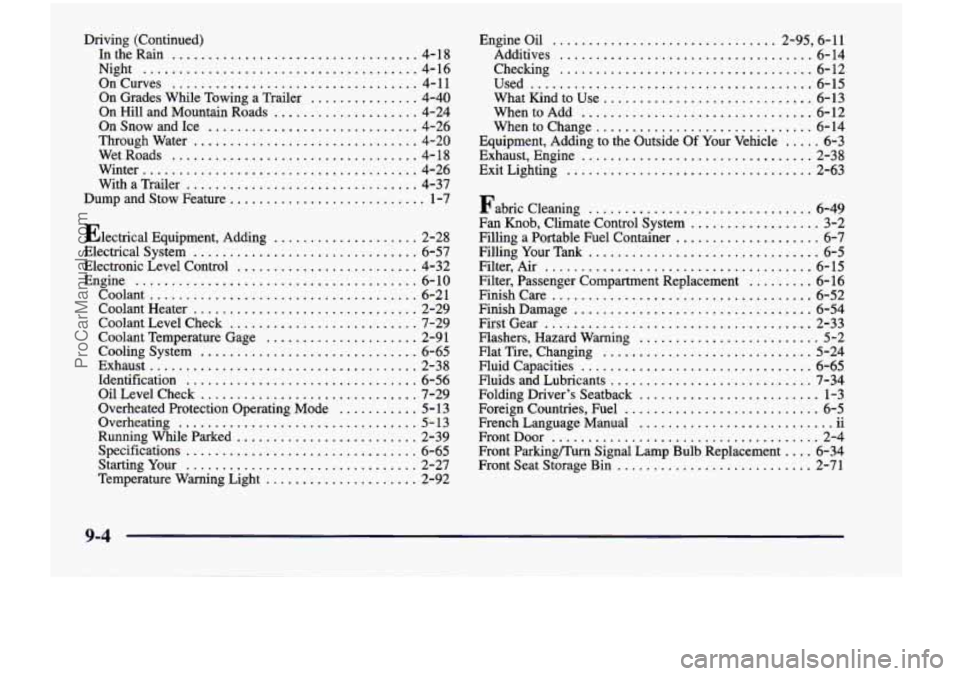1998 CHEVROLET VENTURE run flat
[x] Cancel search: run flatPage 6 of 474

a The 1998 Chevrolet Venture Owner’s Manual
1-1
2-1
3-1
4- 1
5-1
6-1
7-1
8-1
9- 1
Seats and Restraint Systems
This section tells you how to use your seats and safety belts\
properly. It also explains the “SIR’ system.
Features and Controls
This section explains how to start and operate your vehicle.
Comfort Controls and Audio Systems
This section tells you how to adjust the ventilation and comfort co\
ntrols and how to operate your audio system.
Your Driving and the Road
Here you’ll find helpful information and tips about the road\
and how to drive under different conditions.
Problems on the Road
This section tells what to do if you have a problem while driving,\
such as a flat tire or overheated engine, etc.
Service and Appearance Care
Here the manual tells you how to keep your vehicle running pr\
operly and looking good.
Maintenance Schedule
This section tells you when to perform vehicle maintenance and \
what fluids and lubricants to use.
Customer Assistance Information
This section tells you how to contact Chevrolet for assistance \
and how to get service and owner publications.
It also gives you information on “Reporting Safety Defects” on page 8- 10.
Index
Here’s an alphabetical listing of almost every subject in this manual. You can use it to quickly find
something
you want to read.
i
ProCarManuals.com
Page 118 of 474

0 Section 2 Features and Controls
Here you can learn about the many standard and optional features on your vehicle, and i\
nformation on starting,
shifting and braking. Also explained are the instrument panel and the warning systems that tell you if everything is
working properly
-- and what to do if you have a problem.
2-2
2-4
2-8
2-12
2-13
2- 14
2-20
2-22
2-23
2-25 2-26
2-27
2-29
2-30
2-34
2-35
2-37 Keys
Door Locks
Keyless Entry System (Option)
Switchbanks
Sliding Door
Power Sliding Door (Option)
Liftgate
Theft
Content Theft-Deterrent (Option)
New Vehicle “Break-In”
Ignition Positions
Starting Your Engine
Engine Coolant Heater (If Equipped)
Automatic Transaxle Operation
Parking Brake Shifting Into PARK
(P)
Shifting Out of PARK (P) 2-38
2-38
2-39
2-40
2-50
2-53
2-60
2-6 1
2-65
2-66
2-78
2-7
8
2-80 2-82
2-86
2-98 Parking
Over Things That Burn
Engine Exhaust
Running Your Engine While You’re Parked
Locks and Lighting Choices
Windows Turn SignaVMultifunction Lever
Exterior Lamps
Interior Lamps
Mirrors
Storage Compartments
Sun Visors
Accessory Inflator System (Option)
Accessory Power Outlet Instrument Panel
Warning Lights, Gages and Indicators
Driver Information Center (DIC) (Option)
2-1
ProCarManuals.com
Page 197 of 474

has the pressure gage, Then attach that end of the hose
to the object you wish to inflate. Remove the protective
cap covering the outlet. Attach the other end of the hose
to the outlet. Press the ON switch. The ON switch will
work even with the ignition off.
If the air inflator system does not turn on, the fuse may
be blown
or installed incorrectly. See “Fuses and Circuit
Breakers” in the Index or see your dealer for service.
Your air inflator will automatically shut off after about
10 minutes.
To reset, press the ON switch again.
Don’t run your air inflator for longer than
30 minutes at
one time. If you do, you may damage the system. After
30 minutes, wait at least 10 minutes before restarting the
air inflator.
To turn off the inflator, press OFF and detach the hose,
first from the inflated object, then from the outlet.
Replace the protective cap. Place the inflator kit tools
in the pouch, and store in the glove box.
To replace the cover, line up the tabs at the back of the
cover and put it in place. Push down the tab to secure
the cover.
Accessory Power Outlet
The rear power outlet is located in the rear compartment
on the driver’s side. To remove the cover, pull the tab
on
the cover and pull it off.
The front power outlet
is located next to the ashtray and
lighter. Pull the cover down to
use the power outlet.
2-80
ProCarManuals.com
Page 283 of 474

Run your engine only as long as you must. This saves
fuel. When you run the engine, make it go a little faster
than just idle. That is, push the accelerator slightly. This
uses less fuel for the heat that you get and
it keeps the
battery charged.
You will need a well-charged battery to
restart the vehicle, and possibly for signaling later on with your headlamps. Let the heater run for a while.
Then, shut the engine off and close the window almost
all the way to preserve the heat. Start the engine again
and repeat this only when you feel really uncomfortable
from the cold. But do it as little as possible. Preserve the
fuel as long
as you can. To help keep warm, you can get
out of the vehicle and do some fairly vigorous exercises
every half hour or so until help comes.
Loading Your Vehicle
COLD TIRE PRESSURE
00
00
on
The Certificationire label is found on the rear edge of
the driver’s door.
The label shows the size of your original tires and the
inflation pressures needed to obtain the gross weight
capacity of your vehicle. This
is called the Gross Vehicle
Weight Rating (GVWR). The GVWR includes the
weight of the vehicle, all occupants, fuel and cargo.
4-30
ProCarManuals.com
Page 461 of 474

Driving (Continued) IntheRain
.................................. 4-18
On Curves
.................................. 4- 11
On Grades While Towing a Trailer ............... 4-40
On Hill and Mountain Roads
.................... 4-24
OnSnowandIce
............................. 4-26
Wet Roads
.................................. 4-18
Winter
...................................... 4-26
WithaTrailer
................................ 4-37
Night
...................................... 4-16
Through Water
............................... 4-20
Dump and Stow Feature
........................... 1-7
Electrical Equipment. Adding
.................... 2-28
Electrical
System ............................... 6-57
Electronic Level Control
......................... 4-32
Engine
....................................... 6-10
Coolant
..................................... 6-21
Coolant Heater
............................... 2-29
Coolant Level Check
.......................... 7-29
Coolant Temperature Gage
..................... 2-9 1
Cooling System .............................. 6-65
Exhaust
..................................... 2-38
Identification
................................ 6-56
Oil Level Check
.............................. 7-29
Overheated Protection Operating Mode
........... 5- 13
Overheating
................................. 5-13
Running While Parked
......................... 2-39
Specifications
................................ 6-65
StartingYour
................................ 2-27
Temperature Warning Light
..................... 2-92 Engine
Oil ............................... 2.95. 6.11
Checking
................................... 6-12
Additives
................................... 6-14
Used
....................................... 6-15
What Kind to Use
............................. 6-13
WhentoAdd
................................ 6-12
When to Change
.............................. 6-14
Equipment. Adding to the Outside Of Your Vehicle ..... 6-3
Exhaust. Engine
................................ 2-38
Exit Lighting
.................................. 2-63
Fabric Cleaning
............................... 6-49
Fan Knob. Climate Control System .................. 3-2
FillingYourTank
................................ 6-5
Filter. Air
..................................... 6-15
Filter. Passenger Compartment Replacement
......... 6-16
Finishcare
.................................... 6-52
Finish Damage
................................. 6-54
FirstGear
..................................... 2-33
Flashers. Hazard Warning
......................... 5-2
Flat Tire. Changing
............................. 5-24
Fluid Capacities
................................ 6-65
Fluids and Lubricants
............................ 7-34
Folding Driver’s Seatback
......................... 1-3
Foreign Countries. Fuel
........................... 6-5
Filling a Portable Fuel Container
.................... 6-7
FrenchLanguageManual
........................... ii
FrontDoor
..................................... 2-4
Front ParkingEurn Signal Lamp Bulb Replacement
.... 6-34
Front Seat Storage Bin
........................... 2-71
9-4
. . .
ProCarManuals.com